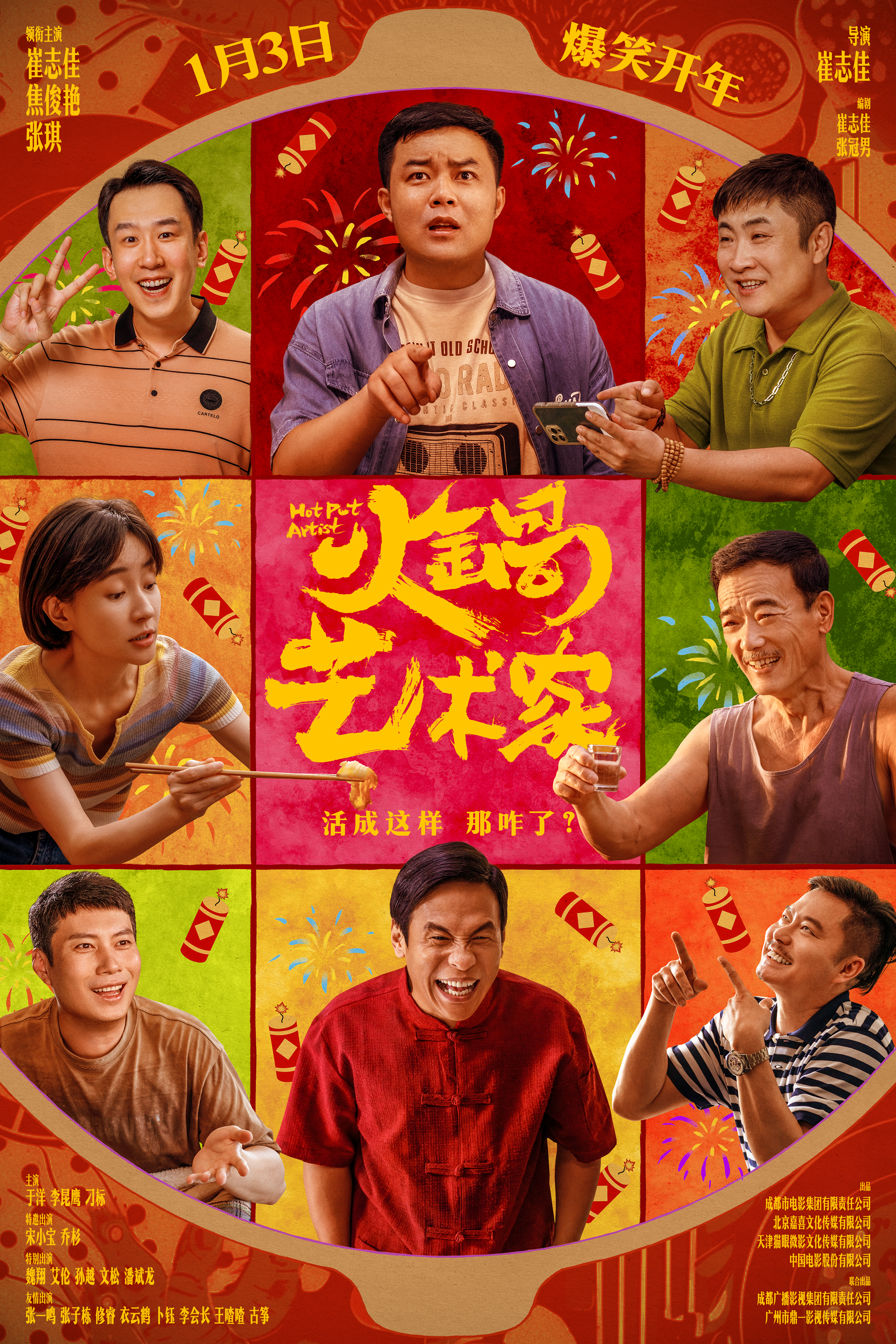
On December 28, the hilarious comedy film "Hot Pot Artist" held its premiere in Beijing. Director Cui Zhijia, starring Jiao Junyan, Zhang Qi, Song Xiaobao, Yu Yang, Li Kunying, Diao Biao and others attended the post-screening meeting and interacted with the audience. The film will be released nationwide on January 3.

Poster of "Hot Pot Artist"
The film tells the story of the down-and-out director Li Ruyi (played by Cui Zhijia) whose new play is facing withdrawal of investment. On the one hand, his old friends politely refuse to lend money, and on the other hand, creditors come to collect debts. When he is helpless, he has to turn the crew's warehouse into a hot pot restaurant, and display his amazing talent for cooking hot pot base, leading all the members of the crew to "re-employment".

Director Cui Zhijia
At the meeting, director Cui Zhijia, who has been deeply involved in Northeast comedy for many years, said that "Hot Pot Artist" still continues the story feature of "small people counterattack refreshing articles". "We all think that food is the best entry point, and hot pot is the most barrier-free food for audiences across the country. I have filmed barbecue before, and this time the hot pot theme is more all-encompassing. At the end of the film, Li Ruyi faces the dilemma of art and life. I think that when you are not suitable for artistic creation, it is understandable to use a skill in life to prove your life value, and it is also okay to want to stick to your dream and be a lone brave. It’s just that when we are at the bottom of our lives, we must remember to return to our families and feel the warmth of our families."

Actor Jiao Junyan
Actress Jiao Junyan filmed a comedy movie with many Northeastern comedy stars for the first time. She said the director was really amazing. "He wrote, directed and acted by himself. I think you need to study any of these majors for four years in college. But on the set, in addition to acting out his role, he can often spot small problems with lighting or group performances with just a glance, which shows his superpowers as a director."

Actor Zhang Qi
Veteran actor Zhang Qi said that "Hot Pot Artist" is the sixth work he has collaborated with the director. "The tacit understanding between us is natural. Every cooperation is a fresh and happy experience. Because I play an old man from Sichuan this time, the biggest challenge is how to speak authentic Sichuan dialect. I tried my best to keep the Sichuan dialect lip shape in my performance, and also took into account the high standard of unity of sound and image. In the end, a Sichuan actor helped me to complete the dubbing."

Actor Song Xiaobao.
Actor Song Xiaobao recalled that he was really scared in the "midnight horror" scene where Xiaotian was tricked. "Before filming began, the director did not tell me what the scene would be like. When I went in, I saw it was all white... and the eyes of the extras in mourning were so into the role that the atmosphere was instantly full. In fact, every comedian has the dream of becoming a director. We may be questioned in the process, but we all complete it with the greatest awe for the film. Everyone's happiness and laughter is the greatest feedback to the creators."
During the post-screening interactive session, Director Zhang Luan said that there was constant laughter at the screening, and that there was high-quality laughter everywhere. "When I was watching the film, I was actually worried that the film would still have the usual sensationalism at the end, but the director handled it very restrainedly. Borrowing the title of the film directed by Li Ruyi in the film, "A Place for the Director", Director Cui Zhijia is constantly improving in each of his works, and there will definitely be a 'place' for you in the Chinese comedy film market."

A group photo of all the main creators of "Hot Pot Artist"
Film critic Tan Fei also praised the film's ending during his speech. "It would be awkward if it really showed Li Ruyi continuing to be a director and even succeeding. This open-ended and anti-routine ending is more meaningful. As a Chengdu native, I not only saw how the director made hot pot come alive, but also saw how the comedy styles of two different regions, Northeast China and Sichuan, were perfectly blended in the film."


